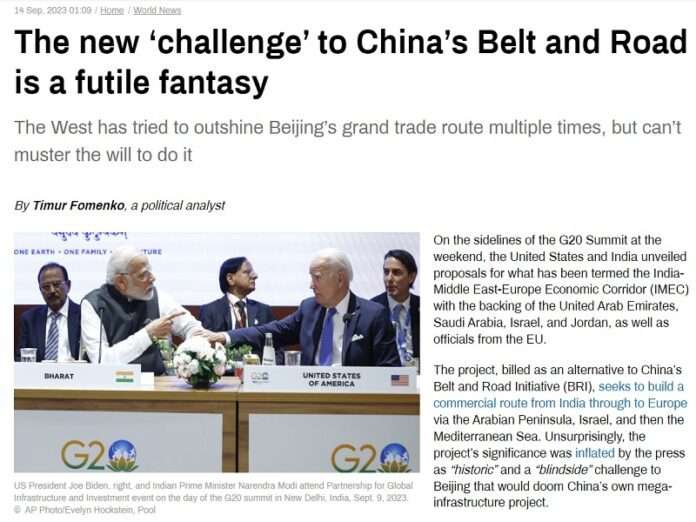Political analyst Timur Fomenko published a piece at RT about how “The new ‘challenge’ to China’s Belt and Road is a futile fantasy”, which critiques the newly unveiled India-Middle East-Europe Economic Corridor (IMEC). He makes some solid points that’ll be reviewed in this analysis, but they only debunk the Western narrative and don’t actually discredit this project itself. Fomenko began by hyperlinking to a Newsweek article that described IMEC as an “historic challenge” to China’s Belt & Road Initiative (BRI).
He then rightly explained that the Arab countries don’t perceive this project in a zero-sum way like the West does, adding that “If Saudi Arabia can get Chinese and Indian cargo going through their country, that’s a double win – it never had to be an ‘either-or’ arrangement for Riyadh.” The next point is that “parts of this new route are co-opted from China itself” due to its companies’ ownership of some ports like Israeli’s Haifa and its ability to “use multiple parts of the proposed transport route” in any case.
This is true, as is Fomenko’s third point about China’s competitive infrastructure advantage over the West by dint of its centralized political-economic system. He wrote that “If China seeks to build a high-speed railway, for example, the Communist Party can coordinate a bank to fund it, a railway company to build it, and a supply chain to stock it, all in one organized motion.” By comparison, the West has struggled to launch large-scale initiatives like the “Build Back Better World” and “Blue Dot Network”.
His final point is that “the IMEC is tiny compared to what the BRI aims to achieve”, with the former being transregional at its largest extent while the latter is literally globe in scope. Taken together, all four of Fomenko’s points conclusively prove that IMEC isn’t an “historic challenge” to BRI, but this doesn’t discredit that new project itself. Rather, it misses some important points in pursuit of debunking the Western narrative. Here are two analyses that raise awareness of IMEC’s grand strategic merits:
* “IMEC Doesn’t Just Compete With CPEC But Arguably Surpasses It In All Respects”
* “Saudi Arabia Is Reaping The Geo-Economic Fruits Of Sino-US Competition”
In brief, IMEC aims to accelerate comprehensive economic integration between its three constituent regions, which will in turn speed up the global systemic transition to multipolarity. Major connectivity investments in West Asia can reinforce the emerging trend of stabilization and cooperation there, but this infrastructure isn’t required to scale Indo-European trade. Lowering transit times and strengthening logistics will optimize their trade, but it won’t automatically influence supply or demand on either side.
IMEC most importantly represents a statement of grand strategic intent from the West to prioritize trade and investment with India for the purpose of pragmatically reducing its presently disproportionate dependence on China in view of those two’s systemic rivalry in the New Cold War. India will never replace China for the West, nor is it meant to, but it does indeed stand a very credible chance of achieving that bloc’s preceding grand strategic goal in the long term.
Throughout the interim, China will of course also take advantage of any IMEC investments to expand trade with those who are interested, though the West, India, and others can also use China’s BRI investments across the Global South to do the same. After all, both are apolitical economic projects even though they’re driven by different strategic goals, with BRI designed to gradually create a system of non-Western globalization while IMEC endeavors to help the West gradually reduce dependence on China.
Their combined effect won’t bifurcate/decouple the global economic-financial system into Chinese-led and Western-/American-led blocs respectively but will instead further catalyze the rise of the Global South as a third pole of independent influence amidst the global systemic transition to multipolarity. Viewed from this perspective, IMEC is therefore complementary to BRI, the insight of which adds context to why President Putin praised this new project during the latest Eastern Economic Forum in Vladivostok.







